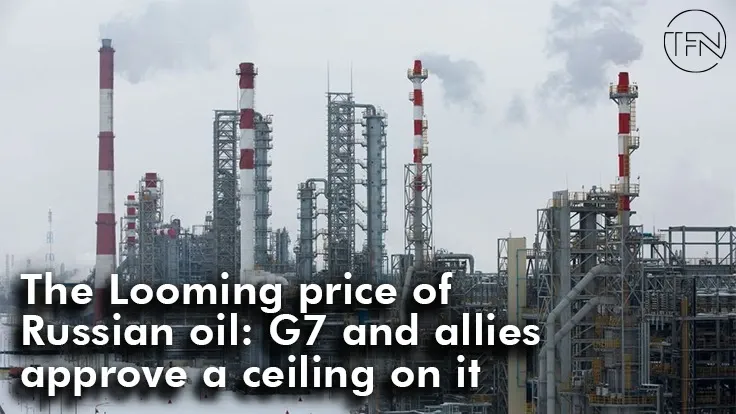On Friday, the G7 club and its allies formally put a restriction on the cost of Russian oil. In the upcoming days, the cap is anticipated to become effective. Shortly after the European Union decided on its price cap, the decision was made. Both strategies will prevent G7 and European nations from spending more than $60 per barrel of crude oil.
The cap on oil prices has been set at a figure that is roughly 5% less than the market value. One barrel of Russian Urals crude oil is currently worth $64.
The price cap attempts to both prevent price surges and stop Russia from reaping huge profits from the sale of oil, which it then uses to fund its conflict in Ukraine.
The deal was reached after several months of discussion. Many EU countries bordering Russia had argued for the lowest price restriction feasible, rejecting initial EU proposals to set the threshold at $67–70.
The G7 and Australia said in a joint statement that they had decided to "prevent Russia from profiting from its war of aggression against Ukraine, support stability in global energy markets, and minimize the negative economic spillover of Russia's war of aggression, especially on low- and middle-income countries."
By prohibiting the marine import of Russian crude oil on December 5, the EU will further reinforce this price cap. Only oil supplied by the sea at or below the price cap will be available to those who signed the G7 agreement and are not subject to the EU prohibition.
Russia has previously condemned the plan and threatened to cut off supplies to countries that implemented a price ceiling. The action will have a big impact on the Russian economy because the country's state budget is financed by the sale of minerals and hydrocarbons.
Russia is anticipated to shift its oil sales even further toward the East to lessen the price caps' negative economic effects.
The two biggest countries currently purchasing Russian crude oil are India and China.
Before the war, Germany was the main consumer of more than half of Russia's oil supplies to Europe. Most European countries are now seeking to diversify their energy supplies as they wean themselves off their reliance on Russian energy.
Supply worries
Amid worries that the supply may be harmed by Russia's invasion of Ukraine, oil and gas prices have skyrocketed.
Russia, which supplies almost a third of Europe's needs with crude oil, is the world's second-largest producer behind Saudi Arabia.
The price limitation, according to US Treasury Secretary Janet Yellen, would prevent supply disruptions while further limiting Russian President Vladimir Putin's financial resources and "limiting the income he's using to pay for his horrific invasion."
Volodymyr Zelensky, the president of Ukraine, referred to the cap as "a weak posture" that was not "serious" enough to harm the Russian economy.
Russia has vowed to reject the price cap and threatens to stop supplying oil to nations that do so.
On Monday, a maritime import embargo on Russian crude oil will go into effect throughout the EU.
Russia will undoubtedly feel the effects of the sanctions, but the blow will be somewhat lessened by its decision to sell its oil to other markets, like India and China, which are now the two biggest consumers of Russian petroleum.

